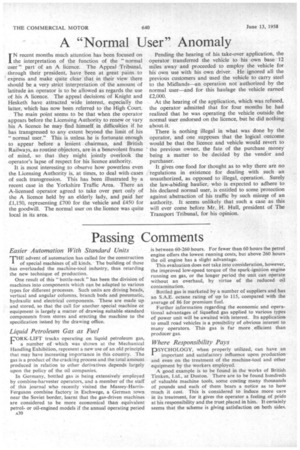A "Normal User" Anomaly
Page 32

If you've noticed an error in this article please click here to report it so we can fix it.
IN recent months much attention has been focused on the interpretation of the function of the "normal user" part of an A licence. The Appeal Tribunal, through their president, have been at great pains to express and make quite clear that in their view there should be a very strict interpretation of the amount of latitude an_ operator is to be allowed as regards the use of his A licence. The appeal decisions of Knight and Hesketh have attracted wide interest, especially the latter, which has now been referred to the High Court.
The main point seems to be that when the operator appears before the Licensing Authority to renew or vary his A licence he may find himself in difficulties if he has transgressed to any extent beyond the limit of his "normal user." This is unless he is fortunate enough to appear before a lenient chairman, and British Railways, as routine objectors, are in a benevolent frame of mind, so that they might jointly overlook the operator's lapse of respect for his licence authority.
It is most interesting to observe how powerless even the Licensing Authority is, at times, to deal with cases of such transgression. This has been illustrated by a recent case in the Yorkshire Traffic Area. There an A-licensed operator agreed to take over part only of the A licence held by an elderly lady, and paid her £1,150, representing £700 for the vehicle and £450 for the goodwill. The normal user on the licence was quite local in its area. Pending the hearing of his take-over application, the operator transferred the vehicle to his own base 12 miles away and proceeded to employ the vehicle for his own use with his own driver. He ignored all the previous customers and used the vehicle to carry steel to the Midlands—an operation not authorized by the normal user—and for this haulage the vehicle earned £2,000.
At the hearing of the application, which was refused, the operator admitted that for four months he had realized that he was operating the vehicle outside the normal user endorsed on the licence, but he did nothing about it.
There is nothing illegal in what was done by the operator, and one supposes that the logical outcome would be that the licence and vehicle would revert to the previous owner, the fate of the purchase money being a matter to be decided by the vendor and purchaser.
It gives one food for thought as to why there are no regulations in existence for dealing with such an unauthorized, as opposed to illegal, operation. Surely the law-abiding haulier, who is expected to adhere to his declared normal user, is entitled to some protection against abstraction of his traffic by such misuse of an authority. It seems unlikely that such a case as this will ever come before Mr._ H. Hull, president of The Transport Tribunal, for his opinion.




































































































